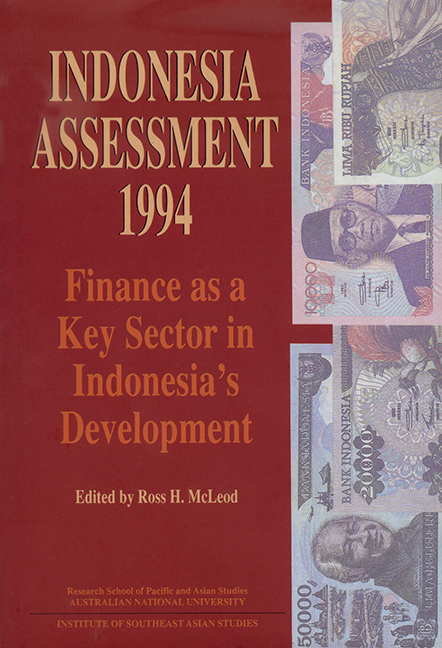Book contents
- Frontmatter
- Contents
- Tables, figures, appendices
- Foreword
- Glossary
- Contributors
- Acknowledgements
- 1 Introduction
- PART A ECONOMIC AND POLITICAL DEVELOPMENTS
- PART B FINANCE AS A KEY SECTOR IN INDONESIA'S DEVELOPMENT
- I The Reform Process
- II Monetary and Exchange Rate Policy
- III Banking Sector Reforms
- 8 Banking sector reforms in Indonesia, 1983-93
- 9 Bank soundness requirements: a central bank perspective
- 10 Bank soundness requirements: a commercial bank perspective
- 11 The case against deposit insurance in Indonesia
- IV Domestic and International Capital Markets
- V Small-scale Finance
- References
- Index
10 - Bank soundness requirements: a commercial bank perspective
from III - Banking Sector Reforms
Published online by Cambridge University Press: 21 October 2015
- Frontmatter
- Contents
- Tables, figures, appendices
- Foreword
- Glossary
- Contributors
- Acknowledgements
- 1 Introduction
- PART A ECONOMIC AND POLITICAL DEVELOPMENTS
- PART B FINANCE AS A KEY SECTOR IN INDONESIA'S DEVELOPMENT
- I The Reform Process
- II Monetary and Exchange Rate Policy
- III Banking Sector Reforms
- 8 Banking sector reforms in Indonesia, 1983-93
- 9 Bank soundness requirements: a central bank perspective
- 10 Bank soundness requirements: a commercial bank perspective
- 11 The case against deposit insurance in Indonesia
- IV Domestic and International Capital Markets
- V Small-scale Finance
- References
- Index
Summary
Introduction A commercial banker recently described his bank's predicament as having to play in a field that has shrunken due to increased competition and, at the same time, having to perform with his hands tied behind his back ever more tightly, as a result of stricter central bank soundness requirements. The consequence, at least for the time being, has been a decline in the banking industry's profitability, most notably among the state banks. External market factors as well as stricter soundness regulations have both contributed to this trend. As improving soundness imposes certain costs, the dilemma for regulators is how to impose regulations that will improve bank soundness, without cutting too deeply into the banks’ profitability. Although a profitable bank might not necessarily be healthy, a healthy bank needs to be profitable.
In this paper, the challenges faced by banks are categorised into two areas. The first is external market conditions, highlighted by an increasingly competitive market as a result of the government's deregulation measures; these began in 1983, but had their strongest impact from 1989. The second is the stricter central bank regulations, introduced in 1991, designed to strengthen the soundness of banks. It is important to put the latter topic into better perspective, by touching first on the rapidly changing market environment faced by banks. The banks’ responses to these challenges are then discussed, and the paper concludes by noting various current trends, and those which might be expected to emerge in the near future.
External market conditions
Three market developments that had a major impact on banks during 1989-93 were: deregulation, that significantly increased competition among banks; the increasing importance of, and activity in, the capital market; and, as inflationary fears grew in the early part of the period, the government's tight monetary policy launched in 1991, which slowed bank asset growth considerably.
- Type
- Chapter
- Information
- Indonesia Assessment 1994Finance as a Key Sector in Indonesia's Development, pp. 171 - 185Publisher: ISEAS–Yusof Ishak InstitutePrint publication year: 1994



